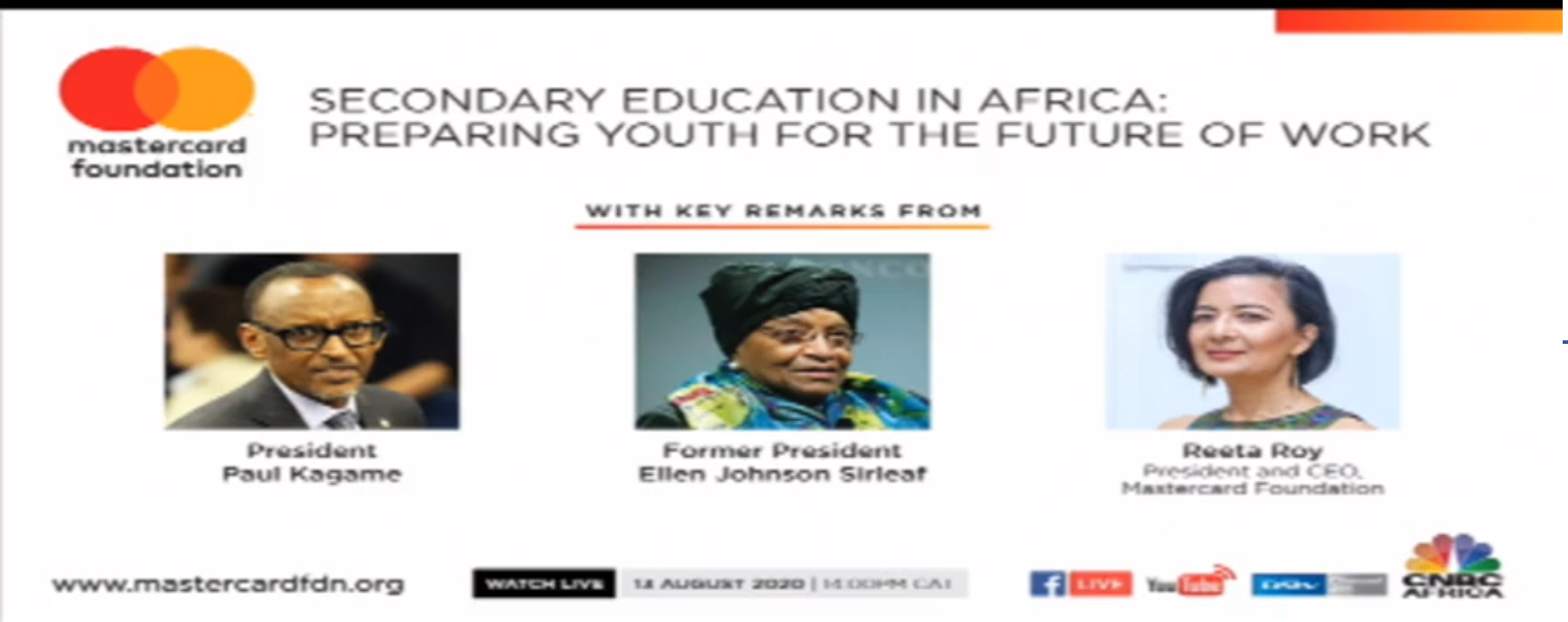August 13, 2020: Kigali, Rwanda — The Mastercard Foundation today released the report, Secondary Education in Africa: Preparing Youth for the Future of Work. Report findings indicate that changes in the nature of work are placing a premium on skills that help young people be adaptable, resilient, and creative problem solvers. Secondary education that provides relevant skills to young workers will help improve productivity, particularly in the informal sector, and will play an important role in driving long-term economic growth and reducing poverty in Africa.
In her opening remarks during the Secondary Education in Africa Virtual Summit Mastercard Foundation President and CEO Reeta Roy said “Digitization, automation, and technological advancements are already changing the nature of work in Africa. Young people must enter the workforce from secondary education equipped with the right skills. So, strategic investments into secondary education can be a big part of ensuring young people and their countries emerge from the other side of COVID-19 stronger and more inclusive.”
Across the continent, the youth population is growing and is expected to reach 456 million by 2050. This growth, along with improvements in the number of young people enrolling in, and completing, primary education is increasing the demand for secondary education. Enrollment is expected to double by 2030, representing an additional 46 million students at the secondary level over the next 10 years. This in turn requires an expansion in the education workforce. Over the next 10 years, an additional 10.8 million teachers will be needed. Ensuring high-quality teachers are in classrooms is one of the most strategic investments a country can make to enable all students to develop the skills they will need for work and as citizens of a global world.
Talking about findings in the Secondary Education in Africa report, His Excellency President Paul Kagame of Rwanda underscored the need for cross-sectoral partnerships to achieve the report’s proposed recommendations. “Secondary school is the critical link that prepares young people to succeed in the workplace. This report sets out some key principles we need to take on board to adapt our secondary education systems for the future. The report emphasizes the importance of constant innovation, driven by data and the spirit of experimentation. This is where collaboration is essential between government, the private sector, and civil society."
In her keynote address during the Virtual Summit, which was attended by policymakers, educators, and young people, former President Ellen Johnson Sirleaf emphasized the importance of investing in relevant, high-quality, universal secondary education as a lever for advancing inclusion. “There is no greater driver of inclusion than a quality education. And there is nothing that can more quickly devastate hopes for the future than to have it taken away,” she said.
President Sirleaf went on to suggest that prioritizing investments in education would be critical to enabling Africa’s recovery from COVID-19. “After Ebola devastated Liberia, forcing us to close our schools for many months, we realized that we needed to place learning at the centre of the recovery process,” she said. She added that, “As we recover from this current crisis, it is my strong belief that collaborative partnership is key to re-imagining a secondary education system that is fit for our future."
The Secondary Education in Africa report was released on the Mastercard Foundation’s website with an accompanying report entitled “Youth Perspectives on Secondary Education in Africa” that features the views and voices of a diverse range of young people. Among them, is Joseph Opoku, who believes that “many young Africans consider secondary school to be a critical juncture in determining the road ahead,” and that “young people want a secondary education that adequately prepares them for employment and/or entrepreneurship.”
GESCI has since 2013 worked with Mastercard Foundation on implementing an innovative and scalable ICT In Education Programme in Kenya, Tanzania and from 2017 in Cote d'Ivoire.The Strengthening Innovation and Practice in Secondary Education (SIPSE) Project was implemented between July 2013 and May 2015. to pilot innovative use of ICTs in the professional development of secondary school teachers. The African Digital Schools Initiative Programme which started in 2016 in Kenya, 2017 in Tanzania and Cote d'Ivoire has reached over 1500 teachers and 210,000 students in secondary schools.GESCI will continue to work with governments and partners in providing strategic supports to develop and implement models of good ICT-based practice for high-quality education & training and to build effective leadership abilities in ICT and Knowledge Society development among Government officials across the Developing world; this report will play a huge part in achieving this.
- Helen White
Strategy Lead, Program Communications
T: +27 76 166 5372
Email: hwhite@mastercardfdn.org
About the Mastercard Foundation The Mastercard Foundation works with visionary organizations to enable young people in Africa and in Indigenous communities in Canada to access dignified and fulfilling work. It is one of the largest, private foundations in the world with a mission to advance learning and promote financial inclusion to create an inclusive and equitable world. The Foundation was created by Mastercard in 2006 as an independent organization with its own Board of Directors and management. Mastercard Foundation’s Commitment to Secondary Education in Africa Understanding that education is a catalyst for social and economic change, the Foundation has committed over USD 350 million to secondary education programming in Africa. The Mastercard Foundation Scholars Program provides access to quality secondary education and leadership development for over 26,000 young people. The Leaders in Teaching initiative supports the training and professional development of teachers and school leaders. Other programming focuses on innovative approaches to equitable and high-quality secondary education. Most recently, the Mastercard Foundation has established the Centre for Innovative Teaching and Learning, which aims to spark innovation in the use of ICT in secondary education. For more information on the Foundation, please visit: www.mastercardfdn.org

